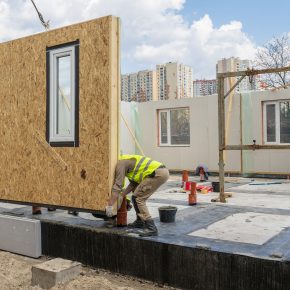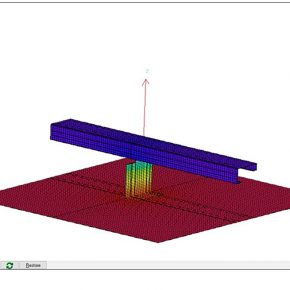
GUEST ARTICLE: Creating a construction industry that’s fit for the future
Charlie Fleet, Managing Director at wall coverings specialist, Reco Surfaces, explains why the construction industry needs to embrace offsite construction methods in this guest article…
“2020 has caused us to reflect on many of the things we take for granted and to think carefully about how we need to adapt, change and improve in order to meet the challenges of a changing world.
The way that we build is no exception, as the construction industry needs to question entrenched ideas about how it operates if it is to evolve into a sector that is able to deliver tomorrow’s built environment.
The reasons that the industry needs to change are multifaceted, as even before the COVID-19 pandemic the construction sector was being called on to build faster, better and higher than ever.
These demands are exemplified by the government’s target of building 300,000 homes a year, combined with the fact that residents are increasingly demanding that new homes are of a higher standard than existing ones.
A Glenigan study underlined the industry’s struggle to meet these current expectations when it found that just 68% of projects finished within budget and only 41% came in on time.
Now, added to all this is the backlog caused by the lockdown and the call for faster construction from Boris Johnson’s “Project Speed” initiative.
This combination of factors makes it clear that the industry needs to find new ways of working that will enable it to move forward at the pace required without sacrificing on quality, sustainability or functionality.
Increasing productivity and outputs
Volumetric modular manufacturing is one route to change that will help the construction industry overcome the challenges it’s facing.
This type of manufacturing is central to offsite construction methods, as it allows for large quantities of building materials to be quickly and reliably produced to the same dimensions and standards.
Research by the UK Commission for Employment and Skills (UKCES) estimated that if 25% of the UK construction sector moved to offsite building then this would achieve a 3.6% increase in productivity, while new homes could be built 30% faster than is possible using traditional methods. Currently however, only around 5% of construction in Britain is built offsite.
New ideas and new materials
Not only does volumetric modular manufacturing provide a new way of working, but it is also an opportunity to rethink the materials that normally go into our buildings.
As the products are being produced in a controllable environment without the complexities of completing all the work onsite, manufacturers can be more flexible in their choices and use solutions that wouldn’t have been practical before.
One example of this is the ability to use plastic alternatives to replace products that have been a mainstay of construction but which are less well suited to today’s realities.
This is the case with tiling in kitchens and bathrooms, which is typically heavy, expensive and time consuming to install.
Instead, PVC panels that look identical to traditional tiles can be produced in volumetric modular factories that are not only perfect for offsite construction practices but which can be more easily tailored to the developer’s specific requirements.
This customisation stems from the fact that plastic solutions produced in a factory can be quickly and simply altered to the design, size and form that the project needs as it isn’t restricted by the typical constraints of ceramic tiles, where extensive customisation can be difficult or cost prohibitive.
In addition, by being able to choose plastic panels the end user is given a bathroom or kitchen environment free from the issues associated with ceramic tiles.
This includes removing the need for grouting, which can harbour mould, as well as being much easier to repair and replace compared to the hassle of a complete tiling refit.
Increasing the use of plastics might appear to be incongruous with the need to build more sustainably, but by producing these solutions in a controlled environment it’s much easier to monitor the quantity of material used while also optimising its ability to be recycled.
The innovations that are now possible thanks to offsite techniques are mirrored in a number of other building materials.
For example, fully glazed and finished window systems connected to cavity barriers can be supplied in one go and simply slotted into a building’s timber frame, removing a long list of tricky and technical processes that would otherwise have to take place onsite.
When it comes to heating, many developers are turning to offsite fabricated boiler rig modules due to the fact that they allow for multi-boiler installations to be quickly carried out while simultaneously helping to improve safety levels onsite.
Changing the status quo
All of this versatility makes offsite solutions ideal, as they embody the ability to provide high quality materials at the speed, ease and pricing that the sector needs if it is to build faster and better than ever before.
However, as a rule the construction industry is slow to change and avoids adopting new ways of working. The pressures it’s under right now means that it cannot continue with business as usual and needs to act quickly to invest in modern methods of construction such as volumetric modular manufacturing, so that the sector has the offsite skills, capacity and products it requires.
This will only be achieved by more proactively specifying offsite solutions instead of sticking with the norm, as otherwise the scale of offsite innovations and infrastructure required to meet the challenges facing the construction industry will not be developed.”
Latest news

26th July 2024
Enfield Speciality Doors completes world-class project for Atlas Copco HQ
A rundown office and warehouse building completely transformed into a modern headquarters for Atlas Copco has been fitted with more than 120 internal fire doors from Enfield Speciality Doors.
Posted in Access Control & Door Entry Systems, Articles, Building Industry News, Building Products & Structures, Building Systems, Case Studies, Doors, Interior Design & Construction, Interiors, Posts, Restoration & Refurbishment, Retrofit & Renovation, Security and Fire Protection, Sustainability & Energy Efficiency, Timber Buildings and Timber Products, Wooden products
26th July 2024
Abloy UK launches new white paper
Abloy UK, a leading provider of security and access control solutions, has launched a new white paper.
Posted in Access Control & Door Entry Systems, Architectural Ironmongery, Articles, Building Industry News, Building Products & Structures, Building Services, Doors, Facility Management & Building Services, Health & Safety, Information Technology, Innovations & New Products, Publications, Research & Materials Testing, Security and Fire Protection
26th July 2024
MCRMA Member Profile: David Roy, Director of Roofconsult
David Roy of MCRMA member company Roofconsult has more than 50 years’ experience to draw upon working in the building envelope sector and a unique perspective on how it has changed in that time.
Posted in Articles, BIM, Infrastructure & CAD Software, Building Associations & Institutes, Building Industry News, Building Products & Structures, Building Services, Building Systems, Cladding, Information Technology, Restoration & Refurbishment, Retrofit & Renovation, Roofs, Walls
26th July 2024
Strand: Enhancing Door Functionality and Safety
Craig Fox, Sales Director for Strand Hardware, outlines how door industry professionals might apply door limiting stays…
Posted in Architectural Ironmongery, Articles, Building Industry News, Building Products & Structures, Building Services, Doors, Facility Management & Building Services, Health & Safety, Restoration & Refurbishment, Retrofit & Renovation
 Sign up:
Sign up: